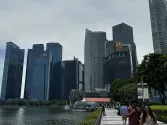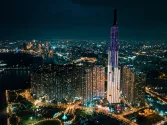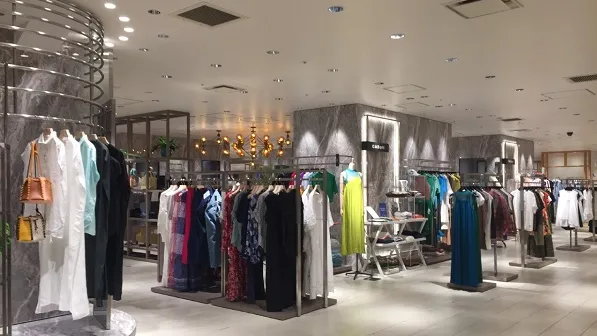
Inside Isetan Mitsukoshi's newly reopened stores
They closed stores in the Tokyo metro area from 8 April to 29 May to prevent infection.
Isetan Mitsukoshi, one of Japan’s top department store chains, reopened its stores in the Tokyo metropolitan area on 30 May after 50 days of temporary closure amidst COVID-19 prevention measures. In order to prevent the spread of infection, they’ve implemented a number of safety measures such as installing thermography scanners at the entrance and asking customers to wear masks.
In the e-tailing space, the store has been working to speed up the number of online sale merchandise for its online customers. The company launched a new service in June, integrating the Mitsukoshi and Isetan sites and apps to offer a new and expanded online environment. During the month, its sales improved at 77.5% YoY, whilst sales for its domestic regional companies hit 86.1%.
In an exclusive interview with Retail Asia, a spokesperson from Isetan Mitsukoshi shared the challenges they faced during the pandemic, as well as details on the initiatives they rolled out to keep their customers and employees safe as well as to boost their bottomline amidst ongoing uncertainties.
Tell us briefly about the trends in Japan’s department store segment. Could you share with us what changed in your operations since the COVID-19 emerged?
Isetan Mitsukoshi’s stores sales (9.8%) show the total sales of the six department stores in the Tokyo Metropolitan Area, including Isetan Shinjuku Main Store, Mitsukoshi Nihombashi Main Store, Mitsukoshi Ginza Store and three other stores. After the COVID-19 emerged, under the emergency declaration of the government, we have closed our six Tokyo metropolitan area department stores from 8 April to 29 May, for more than 50 days. In May, we were able to open the store only for two days, so this is why the May 2020 Store Sales is only 9.8% year on year. Sales also include EC sales, which we closed on the same day as the department stores on 8 April, and restarted from 7 May prior to the store opening.
The main reason we closed all the stores, including the Food Floor, is to prevent infection of employees and customers from the COVID-19. So, most of our employees self-quarantined during the emergency declaration of the government and only the few who needed to work, mainly the headquarter staff, went to the office or worked from home.
Domestic Regional Companies Sales (38.6%) show the total sales of 10 regional companies’ 14 department stores. The situation is different for the regional department stores from the Tokyo Metropolitan Area stores, since some of the stores’ food floors were kept open (other floors were all closed) and restarted the store after 16 May (the restarted dates vary by stores).
Subtotal of Isetan Mitsukoshi Stores Sales and Domestic Regional Companies Sales (21.9%). The bottom part of the sales report shows the line chart of the- monthly sales change for the past one year (year on year). Isetan Mitsukoshi (Tokyo Metropolitan Area) the yellow line and the national department stores average (data from the Japan Department Store Association) the pink line.
September sales were 126.9%, due to the rush demand before the consumption tax hike and reactionary decrease phenomenon occurred in October. November afterwards, the sales were recovering before the COVID-19 emerged.
In the Tokyo Metropolitan Area, we opened our stores from 30 May, and we are trying hard to keep our stores "safe"—setting thermography at the entrance of the store to check temperature of the entering customers and asking customers to wear face masks and sanitize hands when entering our stores. Sales staff wear face masks also.
We’re also keeping the elevator capacity to six persons (in Isetan Shinjuku Main Store—the capacity number varies by stores).

As you recently reopened your flagship stores, are there any new offerings or amenities in these stores you would like to highlight? What has changed for these stores compared to when they closed down?
In the Tokyo Metropolitan Area, we opened our stores from 30 May, and we are trying hard to keep our stores "safe"—we limit the number of entrance(exit) doors so as to set the thermography at the entrance of the store to take the temperature of the entering customers and asking customers to wear face masks and sanitise hands when entering our stores. Sales staff wear face masks also.
What challenges have you faced in reopening?
We tried hard to keep our stores "safe place to shop for customers”—prevention of infection for customers and employees. Since setting the thermography at the entrance and asking customers to wear masks, after reopening the stores, we heard from many of our customers that they feel secure when shopping.
What initiatives have you rolled out in response to the crisis?
As a growth strategy, from couple of years ago, we have been reforming the business model of department stores so that, whether our customers visit our stores in person or shop online (on our website), we can seamlessly provide them with the optimal customer experience anywhere and at any time. Since the crisis, we are working “with speed” to increase the number of online sale merchandise—for our customers who wish to shop online for prevention of infection.
In June, concerning our online service, we have just launched a new service (which we have been working on before the crisis), integrating the Mitsukoshi and Isetan sites and apps and offering a completely new online environment. The most relevant merchandise information and service content, tailored to each individual customer, will be available, together with the convenient e-commerce functions. After reopening the store, we have started some new service for customers-such as using ZOOM to shop certain items.
Isetan Shinjuku was recently awarded as a 2020 gia Global Honoree. What do you think are the stores’ most valuable features that helped them stand out from the rest?
Our Philosophy “Connecting people and bridging times.”
Our strength (most valuable features) is trust (Mitsukoshi and Isetan brands), our customers, and human resources (employees). We will create department stores in the new era by connecting our brands, customers, human resources, real estate, and domestic and overseas stores, which are our strengths, with businesses by using the power of IT, stores, and people.
As Japan is easing its travel restrictions, how do you see the department store segment shifting in Japan?
Due to the travel restriction, at the moment, our foreign customers are not able to visit our stores, and this severe situation may continue until next year. We should wait and prepare for the time when our foreign customers are able to come back to our store to shop again.

Anything you would like to share that we may have missed?
You should be able to see the variety of face masks that we made with 40 brands (designers), over 100 designs, all sold for JPY1650 (including tax). This is a charity project, ”#everyone with masks” that our buyer planned during the self-quarantine and all the profit will be donated to Japanese Red Cross Society. The face masks were sold only online but the masks were displayed in Isetan Shinjuku Main Store. The masks were sold out quickly in a day and right now the masks are being made again for the next sale period at the beginning of July.
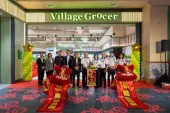

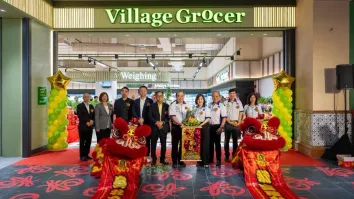
















 Advertise
Advertise


